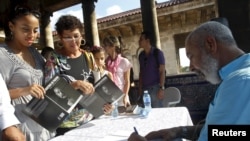Members of the U.S. publishing industry have petitioned President Barack Obama and Congress to lift the decades-old embargo on trade in books and educational materials with Cuba.
The petition says the embargo runs counter to American ideals of free expression and that readers everywhere deserve greater access to books as a basic human right. The publishing industry says books promote cross-cultural understanding, economic development, free expression and positive social change.
Industry officials say Cuba's adult literacy rate is one of the world's highest at nearly 100 percent and that the country boasts a rich literary heritage with much to contribute to book culture.
In a letter posted on the Publishers Weekly website this week, members of the industry noted that in December 2014, Obama announced that the United States would be restoring diplomatic relations with Cuba. They made note of the reopening of the U.S. and Cuban embassies in each other's countries last year and the U.S. decision to remove Cuba from a list of state sponsors of terrorism. They also pointed to a U.S. decision late last year to restore flights between the U.S. and Cuba.
Quick action sought
The publishers said they wanted the book embargo to end as soon as possible, acknowledging that despite progress in bilateral relations, a complete lifting of the U.S. trade embargo against Cuba, which would require congressional action, does not appear close at hand.
The comments came one month after a delegation of about 40 U.S. publishing industry representatives traveled to Havana for two days of meetings with Cuban industry officials. The U.S. publishers and industry officials said their call for a lifting of the book embargo was consistent with the will of the American people, adding that nearly three-quarters of Americans polled supported an end to the trade embargo against Cuba.
The petition to end the book embargo was posted on the White House website and came ahead of a trip to Cuba March 21 by Obama. He will be the first sitting U.S. president to visit Havana in nearly 90 years and is scheduled to meet with President Raul Castro "to discuss how we can continue normalizing relations."
Obama has also said topics during his talks with the Cuban leader will include making trade easier and making it easier for Cubans to access the Internet and start their own businesses. Obama has also said he will meet with members of Cuba's civil society, whom he described as "courageous men and women who give voice to the aspirations of the Cuban people."
Willing to talk
Cuban officials have welcomed the visit and expressed a willingness to discuss any topic.
While normalizing relations, however, Obama has said his administration promises to monitor Cuba's government on human rights.
Republican presidential candidates Marco Rubio and Ted Cruz, both of Cuban descent, have criticized Obama's pending trip. Rubio said the thaw in relations has not resulted in any improvement in human rights in Cuba and that its government "remains as oppressive as ever."
Rubio is a senator from Florida, where thousands of Cuban refugees fled as Raul Castro's brother, Fidel, took power in Cuba in 1959. Many oppose closer U.S. links to their homeland.
Cruz, a Texas senator whose father fled the island in 1957, has said he will not go to Cuba "as long as the Castros are in power." He said he thought Obama's trip was "a real mistake."




